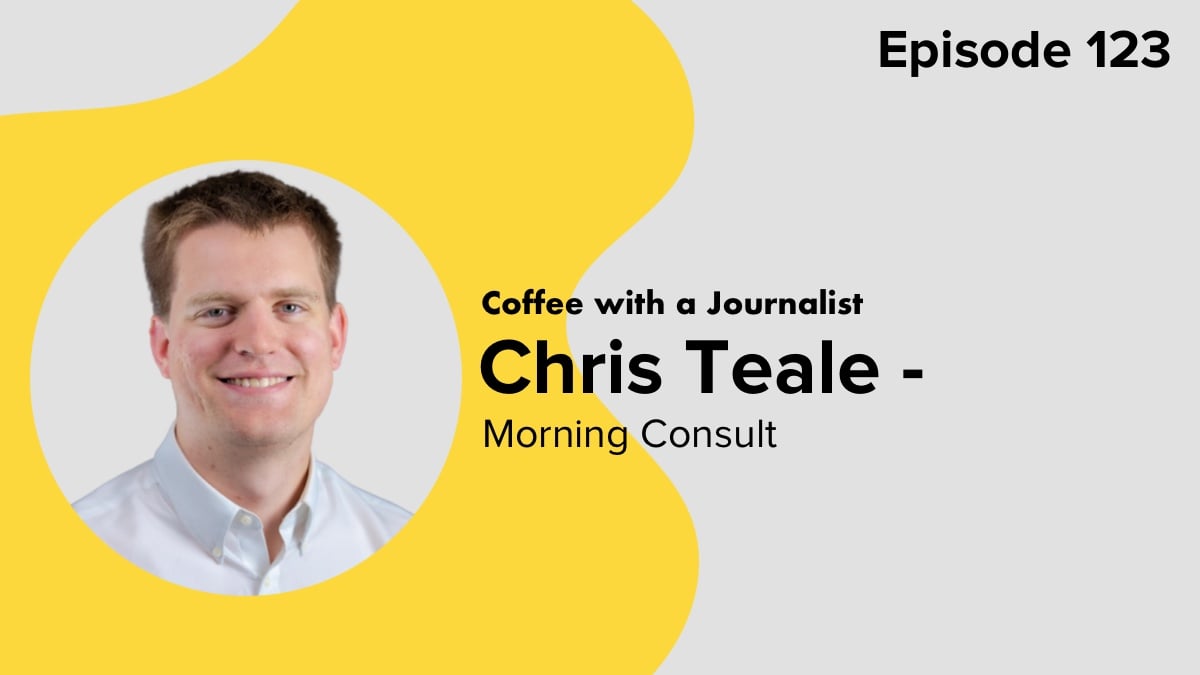Coffee with a Journalist: Chris Teale, Morning Consult

Our guest on the podcast this week is Chris Teale, the technology reporter for Morning Consult. As the technology reporter, Chris uses proprietary polling data, external data sets and interviews with experts from across the sector to write feature-length and short articles about technology trends and news. He also produces a weekly morning newsletter.
During the episode, Chris shares about what Morning Consult is, his process for finding unique stories to write, how you should structure pitches to send his way, and more.
Click below to listen to the full conversation and read below for highlights from the interview:
What Does Morning Consult Cover?
[00:02:17] BB: Washington, D.C. Another good media spot to be. I like it. Chris, before we get into your inbox, could you give us just overarching what Morning Consult is?
[00:02:28] CT: Sure. Morning Consult is a decision intelligence company. We kind of help business leaders make the best decisions that they can. We use proprietary survey data that help shape that. My role within that, I cover technology. I have a morning newsletter that goes out at about eight o'clock eastern every morning. Most important technology news of the day. Also, we'll write a lot of articles using survey data. Again, all just to help people figure out what's next.
[00:03:00] BB: Very important intel, I’m sure, that people definitely need. I highly recommend everyone signs up for your newsletter, by the way, which I just did myself. There's that.
How He’s Sourcing Stories
[00:05:03] BB: Okay, that's not crazy. I was going to say like 2000 or something. Okay, yeah that's not as daunting. But still, impressive. Very good. When you are thinking, Chris, of the stories you want to do and what your newsletter is going to be about, how do you sort out and select the stories you do?
[00:05:21] CT: Wow! That's a really interesting question. The old question of where does news come from?
[00:05:26] BB: Where does it come from?
“An article I wrote that would maybe be less serious, I wrote about catfishing. Pretend to be someone else on social media. Why did I write about that? Because I like watching the show on MTV.”
[00:05:27] CT: One of the great things I like about covering technology is that there are so many ways you can go. I’ll give you a couple of examples I covered towards the end of last year was about social media and whether regulation would finally get off the ground in 2022, whether we're actually going to make it a reality. That comes from following hearings and listening to lawmakers talking about. There's that side of things.
An article I wrote that would maybe be less serious, I wrote about catfishing. Pretend to be someone else on social media. Why did I write about that? Because I like watching the show on MTV. And we've never done a survey on it. And I thought, "Well, this will be perfect. No one else has written about this. Let's do it." It really comes from anything really.
[00:06:14] BB: Okay. You don't have like a process necessarily. Like, "Oh, yeah, I go to do my morning walk around whatever lake. And then I think about what I want to inspire my readers with today." I mean, I’m painting a very unrealistic picture. No one has a routine like that that I’ve ever spoken to on the show. But I was just curious. Okay. That sounds good. All over the place.
Do many, or all, or none of pitches convert to stories?
“That's kind of how I approach things from that perspective. Can we run a survey on it? Can we delve into this proprietary data that no one else has access to out there in the journalism world? And can that then drive the news forward?”
[00:06:41] CT: I’d say a few here and there.
[00:06:43] BB: A few. Okay.
[00:06:46] CT: What we try and do at Morning Consult is we try and write stories that we can do surveys on, if that makes sense.
His Pitching Requests
[00:07:58] BB: That leads me to elements of the pitch. Are there maybe three things that you want to see in every pitch?
[00:08:05] CT: I want to see – Well, first of all, I want it to be short. I don't want it to be full of tech jargon that get weighed down by all of these buzzwords and acronyms and all of this. I don't want any of that. Leave all that at the one side. Let's keep this as simple as possible.
And what's the news? Tell me what you're trying to get across. I don't need paragraphs and paragraphs of scene setting. If you can give me a little bit at the end of why this matters to my readers, I’m all the better for it, because it helps us all get on the same page as early in the pitching process as possible.
[00:08:41] BB: Mm-hmm. Cut the crap. Just get to the point of what it is. I have to say, too, that is increasingly requested from journalists, is we don't need the, "Oh, how was your weekend, Chris? Hope you had a wonderful time in DC. Did you have a nice sail boating adventure? Okay. Now I want to talk –" Like, just what is it? Because we don't have time.
________
Learn more pitch tips and insights from previous guests on Coffee with a Journalist in our journalist spotlight videos available for free on YouTube.
Want more tips from journalists?
Click below to subscribe to Coffee with a Journalist and receive emails highlighting reporters, journalists, and editors and their individual pitching preferences.
